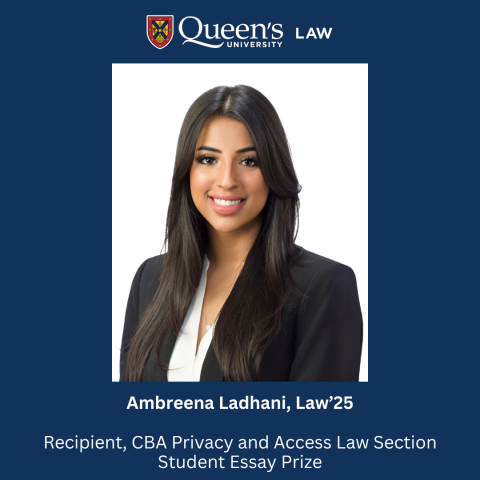
When Ambreena Ladhani, Law’25, first heard the viral “Fake Drake” track — an AI-generated song mimicking the rapper’s voice — she had one question: Does Drake have any legal recourse?
That question sparked a deep dive into Canadian privacy law and led to her award-winning essay, “Fake Drake and the Real Harm: Canadian Privacy Torts Fail to Protect Voice-Cloned Artists.” The paper earned her the Canadian Bar Association’s Privacy and Access Law Section Student Essay Contest prize.
Ladhani says she wrote the paper for her entertainment law course in third year out of genuine curiosity. “The song was catchy, but it made me wonder whether [our laws could keep up with technology].”
Her research revealed a gap: Canada’s privacy torts don’t adequately protect artists from unauthorized voice cloning. After analyzing all four recognized privacy torts, she concluded that the misappropriation of personality tort — a claim that protects a person’s identity, such as their name, image, or voice, from being used without permission for someone else’s benefit — offers the best foundation for reform.
Her paper proposes three incremental changes to this tort:
- Explicitly protect against digital or synthetic voice reproduction;
- Broaden “commercial gain” to cover financial and social benefits;
- Make the tort actionable without proof of damage.
“Together, these reforms would empower artists to seek recourse for the unauthorized use of their voice, ensure Canadian law keeps pace with technological change, and align it with emerging international standards,” she explains.
Ladhani presented her work at the CBA Privacy and Access Law Conference in Ottawa and saw her paper published on the CBA website.
“Receiving a national writing award feels both surreal and rewarding,” she says. “It reaffirmed my belief that creative, forward-looking legal scholarship can have a real impact, especially in emerging areas like technology and privacy law.”
After graduating, Ladhani passed the Uniform Bar Exam in New York and is now joining Gunderson Dettmer — a leading firm for venture capital and growth equity — in its Strategic Transactions and Licensing (Technology) group in NYC.
She credits Queen’s Law for bridging theory and practice to prepare her for a business law career: “Courses like Law (Taylor’s Version) and experiential learning opportunities such as the Business Law Clinic and Legal AI Clinic gave me hands-on experience with real-world challenges faced by entrepreneurs and emerging companies,” she says. “Those experiences taught me to approach complex problems with both analytical precision and practical judgment.”
By Lisa Graham